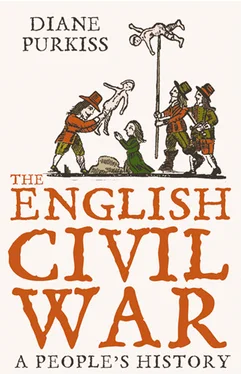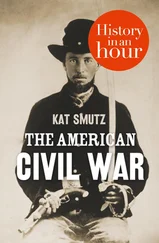Observers thought this outbreak of rage looked exactly like the ‘inundation of the vulgar’, the rising of the belly against the brain, which had been predicted by the Cassandra-like MP Simonds D’Ewes as the inevitable outcome of civil war. Though the rioters themselves sought to justify their actions by claiming support for Parliament, even Parliamentarians among them spoke of the violence of ‘the rude people’: ‘we know not how to quiet them’, muttered the mayor of Colchester, ‘we could not repress them if we had five trained bands’. In parts of Suffolk, where there were further disturbances, the rioters were said to have denied any religious motivation, saying they were for the king, and would not be governed by a few Puritans.
The Essex-Stour valley mob initially confined itself to attacking the local Catholic community, but soon everyone got a taste for the fun, and the violence became less discriminating. ‘As well Protestants as Papists’ were plundered; similar unpolitical incidents involving the ‘lewd and disorderly people’ were reported in the area in the last three months of the year. ‘Forasmuch as at this present there are disorders and distempers … and evil affected persons who hunger after rapines and spoilings and plunder of men’s houses.’ It was an excuse for a spot of vandalism, but it might be premature to assume there was no class distinction behind the plunder of the houses of the rich. There is some shaky evidence from the inexhaustible Ryves that locals picked out as targets families who were already disliked. Ryves shapes his account around the attack on Countess Rivers because it violates codes of honourable conduct in war: ‘And you may guess what spiritual men they were, and likewise what danger this honourable person was in, they express themselves in rude unchristian language, that if they found her they would try what flesh she had?’
The Rivers family felt menaced from the beginning. Lady Rivers’s sister Lady Penelope Gage wrote anxiously from Hengrave Hall, north of Bury St Edmunds, at the very beginning of 1642, that ‘we are daily threatened by the common sort of people’. Living in St Osyth, the Rivers’s Catholicism had long made them the object of local suspicion and dislike. Ryves claimed the Colchester attackers began a kind of cat-and-mouse game with the countess. They pursued her as if she were a comic-book villain. The crowd reached St Osyth only a few hours after she had made her escape; they were joined by sailors and what one local Catholic called ‘the whole army rout’. At once, wrote a contemporary, they ‘enter the house, and being entered, they pull down, cut in pieces, and carry away her costly hangings, beds, couches, chairs, and the whole furniture of her house, rob her of plates and monies’. Her servants were attacked. She made it to her house at Long Melford in Suffolk, but the crowds followed her there, gathering support en route, especially from seamen, a group especially noted for their strong anti-popery. Countess Rivers was understandably afraid. She sent for help to the Earl of Warwick, but he was at sea, Lord Rich was at Oxford, and Charles Rich was out hunting. So Arthur Wilson, steward of the Earl of Warwick, travelled through the Stour valley on his master’s instructions during the riots, hoping to rescue the recusant Lady Rivers from the fury of the mob. Wilson was a Puritan and a Parliamentarian, but he thought very little of the crowd:
With difficulty I passed through the little villages of Essex, where their black bills and coarse examinations put us to diverse demurs. And, but that they had some knowledge both of me and the coach, I had not passed with safety … When I came to Sudbury in Suffolk, within three miles of Long Melford, not a man appeared till we were within the chain. And then they began to run to their weapons, and, before we could get to the market-place, the streets swarmed with people. I came out of the coach, as soon as they took the horses by the heads, and desired, that I might speak with the mayor, or some of the magistrates, to know the cause of this tumult, for we had offended nobody. The Mouth cried out, This coach belongs to the Lady Rivers; and they are going to her, for he had recognised her steward in the coach: and some, who pretended to be more wise and knowing than the rest, said, that I was the lord Rivers. And they swarmed about me, and were so kind as to lay hold on me. But I calmly entreated those many hundreds which encircled me, to hear me speak, which before they had not patience to do, the confusion and noise was so great. I told them, I was steward to the Earl of Warwick, a lover of his country, and now in the parliament’s employment. That I was going to Bury [St Edmunds], about business of his. And that I had letters in my pockets (if they would let any of the magistrates see them) which would make me appear to be a friend and an honest man. That said, the Mouth cried out, Letters, letters! The tops of the trees, and all the windows, were thronged with people, who cried the same. At last the mayor came crowding in with his officers: and I showed him my letters … The mayor’s wisdom said, he knew not my lord’s hand; it might be, and it might not. And away he went, not knowing what to do with me, nor I to say to them.
But the town-clerk, whose father was a servant to the Earl of Warwick, ‘told them I was the Earl of Warwick’s steward: and his assurance got some credit with them. And so the great cloud vanished. But I could go no further to succour the Lady Rivers. For I heard, from all hands, that there was so great confusion at Melford, that no man appeared like a gentleman, but was made a prey to that ravenous crew.’ So he left the coach at Salisbury, ‘and went a bye-way to Sir Robert Crane’s, a little nearer Melford, to listen after the countess’. He thought he was witnessing the actions of an ‘unruly multitude … the rabble’, not those of ‘honest inhabitants’. He thought that they only pretended to religious fervour, while in fact ‘spoil and plunder were their aim’ and that they acted as if ‘there had been a dissolution of all government’; he concluded that ‘so monstrous is the beast when it holds the bridle in its teeth’.
Countess Rivers’s ordeal was not yet over. On Wednesday 24 August, a multitude of like disposed persons, threatening her death’ nearly caught her; they entered the house ‘before she had fully escaped their sight’ (perhaps she had been loath to use the ‘back gate for beggars and the meaner sort of swains to come in at’, noted by James Howell when he visited the house). So the crowds ransacked the house. John Rous reported that ‘the Lady Rivers house was defaced, all glass broken, all iron spoiled, all likely places digged where money might be hidden. The gardens defaced. Beer and wine consumed and let out (to knee deep in the cellar) The deer killed and chased out.’ She may have been helped to escape by Sir Robert Crane; she sought sanctuary at Bury St Edmunds, thirteen miles away. It shut its gates against her. Eventually she was allowed in, but was forced to flee to London the next day.
The crowds, unsatisfied, moved on to other targets: the Audleys, a Catholic family within the liberties of Colchester, who had already been the subject of a panic in 1640 when it had been said that Catholics were assembling for an insurrection. The family’s house and cattle were plundered. On his funeral monument, Sir Henry had written Non aedes (belli civilis furore diructas) (He did not rebuild his house, destroyed by the fury of the civil war); the doggy, compressed Latin suggests some haste. A clergyman called Gabriel Honeyfold was set upon by ‘a multitude of boys and rude people’ who ‘throng about him … throwing stones and dirt at him’. Another minister, Erasmus Laud, lost his cattle too, and the attackers also took all his wife’s spare clothes. He was attacked solely because his name was the same as that of William Laud, the hated Archbishop of Canterbury. All across the east, local Catholic gentry were assailed; the landed Martins whose chapel was itself a provocation; the house of Carey, a steward to the Rivers family. The riots spread to neighbouring locales, including Maldon, where a Catholic landowner named Edmund Church came under attack; ‘the poor people of the neighbourhood pulled down and carried away a barn and an oxhouse, declaring that Edmond Church was a papist’, and that they would pull down his house if any opposed them. As in other civil wars, people who had been warily tolerant neighbours for years suddenly turned on the minority in their midst. Wherever there was a Catholic family, the crowds gathered: the Petres, the Southcotts. The trouble only stopped when Parliament implemented a vigorous programme of Catholic-watching and sequestration.
Читать дальше












